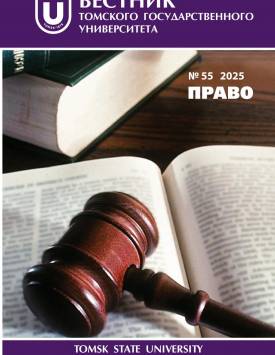Realization of the right to life as the basis for the Russian Federation main national strategic priority
The new National Security Strategy of the Russian Federation defines the conservation of the people and the development of human potential as the main strategic national priority and also lists the goals and objectives to be reached on the way to achieving these aims. It basically means realization of the right to life and the right to the decent life. However, due to some specifics of the current version of the right to life creation of an effective mechanism for transferring constitutional law into specific benefits listed in paragraphs 28-33 of the abovementioned Strategy is not possible. The solution to this problem involves considering the right to life and the right to a decent life as a one single right. According to dialectical materialism, a person is simultaneously considered as a biological and social being, and therefore the right to life cannot be characterized by the biological side only, i.e. the right to life preservation. In this sense, the right to life represents the "sum" of all other rights, socio-economic rights above all. Today, the understanding of content of legal relations between a person and the state, is based most often on an idealistic methodology, which is characterized by considering the studied phenomena, that have economic and legal characteristics, without taking into account all their internal connections and influences. This leads to the fact that the right to life and the right to a decent life are not considered as a one single human right. From this point of view, the right to life is reduced to the right of a person who has committed an particularly grave crime to avoid the death penalty with the granting of him the right to have his case heard in a trial by jury. Given the social antagonism that is still kept in society, it is impossible to deny the importance of such a right to life, but today is not enough. The currently prevailing concept of "the right to life" enshrined in the current legislation limits the duties and responsibility of the public authorities for maintaining the living standards of the population and, accordingly, for the development of socio-economic relations. This version of the standard creates the illusion of the state fulfilling its obligations on public relations. However, the slowdown in economic development and the real standard of living of the population given the growth of unemployment creates a discrepancy between the prevailing understanding of the right to life and the expectations of the vast majority of citizens. Therefore, in a democratic and social state, there is a need for a relevant understanding of the right to life, which is guaranteed by the cohesion of all obligations of the state to ensure that the citizens have the opportunity to use their socio-economic and other rights in accordance with their legitimate interests. Implementing this modern right to life will require the creation of a socially oriented and efficient economy, which will be a stable basis for ensuring Russia's main strategic national priority. Civil peace and harmony in the country will be strengthened, which will provide the political and social foundations of the country's national security. The author declares no conflicts of interests.
Keywords
human rights, right to life, right to decent life, functions of the state, national securityAuthors
| Name | Organization | |
| Migushchenko Oleg N. | Kursk State University | onmig@mail.ru |
References

Realization of the right to life as the basis for the Russian Federation main national strategic priority | Tomsk State University Journal of Law. 2025. № 55. DOI: 10.17223/22253513/55/7
